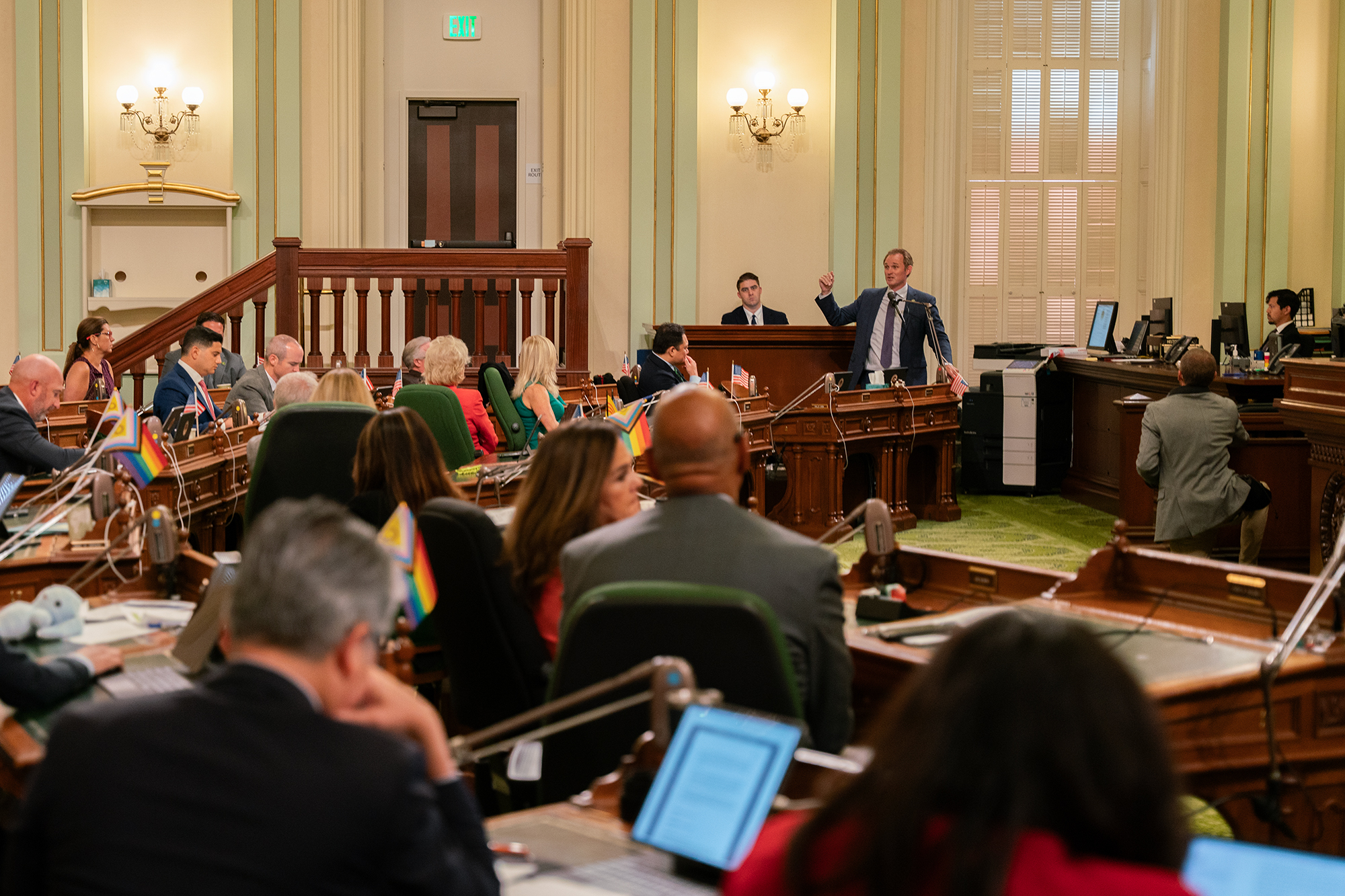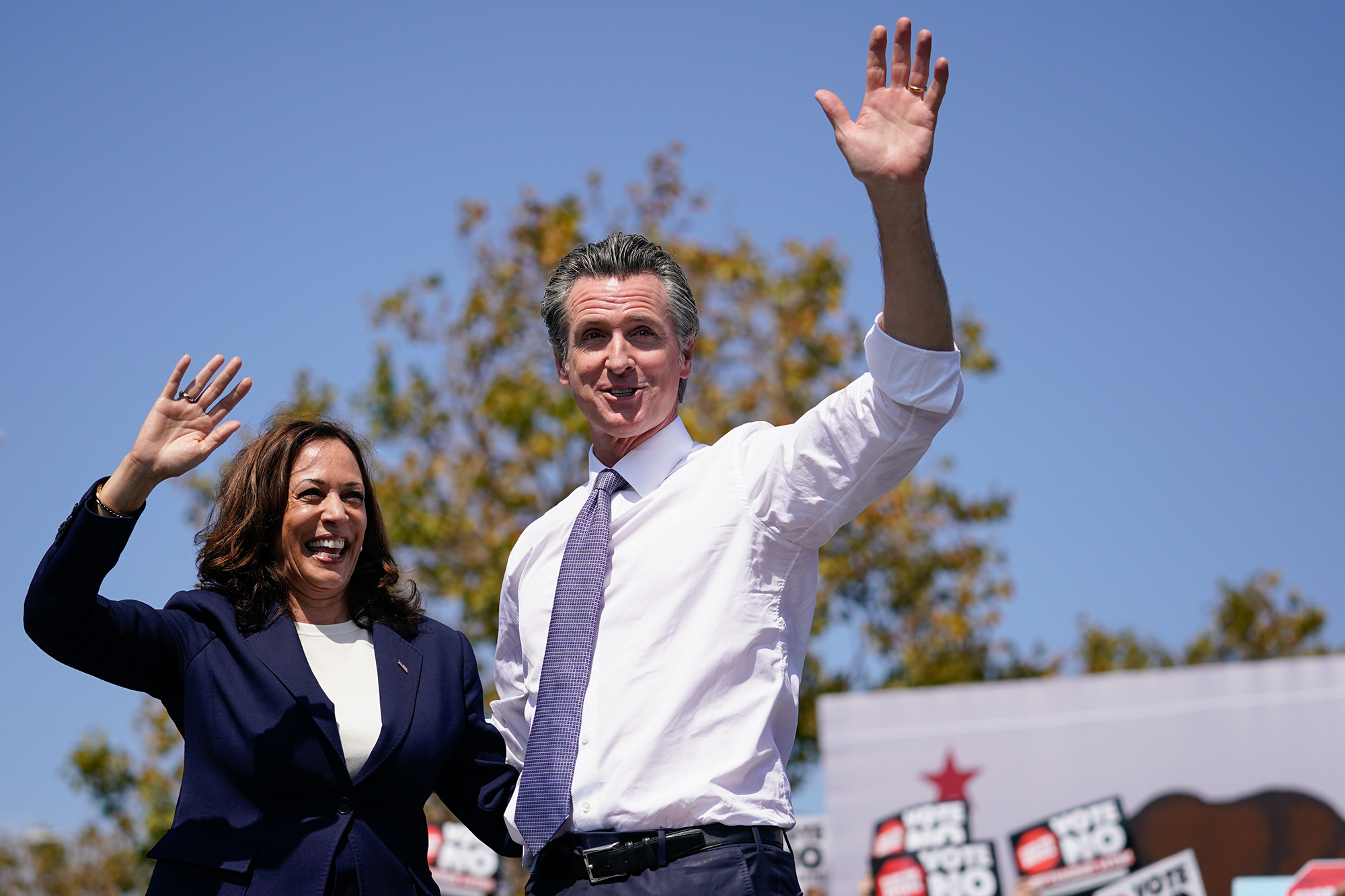
Tuesday night, Gov. Gavin Newsom made a shocking U-turn: He withdrew the proposed ballot measure he and Democratic legislative leaders just announced as a smarter way to tackle retail theft and fentanyl trafficking.
Their measure was supposed to win voters’ favor over a November ballot measure backed by Republican lawmakers, law enforcement groups and prosecutors to roll back Proposition 47 — a 2014 measure that is blamed by some for retail thefts.
Newsom acted after the Democratic bill cleared the Assembly’s public safety committee on a party-line vote earlier Tuesday, but also after a coalition that supported the original proposal pushed back against the Democratic measure and accused the governor and Democratic leaders of political dirty tricks and election interference.
The governor, however, said in a statement that he had the votes in the Legislature to get the measure on the ballot, but not enough time to pass the amendments to make sure it passed. Read more on Newsom’s reversal and the hot takes in our story.
Besides finalizing the November ballot before starting their month-long summer recess tonight, legislators are also busy passing or considering several key bills, including:
LGBTQ notification ban: After a spicy Assembly floor debate last week, a bill prohibiting school districts from enacting policies requiring faculty to disclose to parents if their child identifies as LGBTQ or non-binary now awaits Gov. Newsom’s decision.
As CalMatters K-12 education reporter Carolyn Jones explains, the bill originated after several school boards imposed parental notification (or forced outing) policies last year, despite pushback from state officials. Opponents of the bill, including Sonja Shaw, the president of the Chino Valley Unified school board who led the board’s charge to adopt a notification policy, vowed to continue to fight for parental rights: “The political cartel may have won this round, but they will not win the war,” she said.
Learn more about the bill in Carolyn’s story.
Power companies vs. CEQA: The state’s signature environmental law, known as CEQA, requires developers to pay for impact reports that can cost hundreds of thousands of dollars and take years to complete. But power companies argue that CEQA prevents them from speedily upgrading their transmission lines — something they need to do to meet the state’s clean-energy goals, explains CalMatters Digital Democracy reporter Ryan Sabalow.
One bill, which the Senate Environmental Quality Committee plans to consider today, would streamline the CEQA process for power companies and exempt mandates for power grid updates on state owned-lands, including parks. It has become a particular sticking point for environmentalists who oppose the bill. Said the executive director of the Anza-Borrego Foundation: “Our campgrounds, our hiking trails, our sacred cultural preserves, endangered wildlife habitat, dark night skies and more. Nothing will be protected.”
Update: On Wednesday, the Senate committee removed the exemptions for power companies from the bill.
Gambling battle: Tribal governments on Tuesday won the latest round in a high-stakes and big-money legislative fight over the future of gambling in California. As Ryan and CalMatters data journalist Jeremia Kimelman reported in March, tribal governments that operate major California casinos have been trying for years to get legal standing to sue their competitors, private card rooms. The tribes assert the card clubs are allegedly offering illegal table games such as blackjack.
Tribes have thrown their collective lobbying might and campaign dollars behind Sen. Josh Newman’s Senate Bill 549, which would give the tribes a brief window to sue the card clubs. The cardrooms have responded to the Fullerton Democrat’s bill with an unprecedented lobbying blitz, spending millions.
On Tuesday, more than 100 different cardroom owners, their employees and local officials whose cities’ revenues are tied to card clubs unsuccessfully urged the Assembly Government Organizational Committee to kill the measure. The committee voted 15-1 to advance the bill to the appropriations committee. Six members declined to vote, which counts the same as voting “no.”
Artificial intelligence: The Assembly’s judiciary committee passed Sen. Scott Wiener’s bill to regulate AI that uses massive datasets to train itself and produce content including text and images. The measure calls for establishing security protocols and would hold developers accountable for violations with a civil penalty.
In a statement, the San Francisco Democrat said that while AI can bring “enormous benefits,” California has a responsibility to “reduce the risk of severe harm.”
Wildfire season: Check out CalMatters’ wildfire tracker for live updates on active fires, a FAQ and other information. And find out more on wildfires in our updated explainer.
CalMatters covers the Capitol: We have guides and stories to keep track of bills and your lawmakers, find out how well legislators are representing you, explore the Legislature’s record diversity and make your voice heard.
Other Stories You Should Know
Harris and Newsom stand by Biden

Ever since President Joe Biden’s debate debacle last week — and the fevered speculation that ensued — Gov. Newsom and Vice President Kamala Harris have been among the names bandied about as potential replacements should Biden actually step aside.
But both Newsom and Harris have been steadfast Biden backers, at least in public. Newsom has batted down talk of replacing Biden on the ticket, plans to attend a meeting today with other governors at the White House to show his support and is scheduled to stump for the president Monday in New Hampshire.
Harris has also been making the rounds of cable news shows and holding campaign events to defend her running mate.
She fares better than Newsom in the first major poll to gauge which Democrat might do better against former President Donald Trump in a hypothetical matchup.
Released by CNN on Tuesday, the poll found Trump leading Harris 47% to 45% (within the margin of error), while Trump has a 48% to 43% edge over Newsom. Trump has a similar lead over Transportation Secretary Pete Buttigieg (47% to 43%) and Michigan Gov. Gretchen Whitmer (47% to 42%). Harris does better than the other Democrats thanks to her support among women and independent voters.
While Trump’s 49% to 43% lead over Biden hasn’t changed since a CNN survey in April, three quarters of voters say Democrats have a better chance of winning with another Democrat running.
But take the poll results with two big mounds of salt: It’s a snapshot, and a national one at that, when the race will almost certainly be decided in a handful of swing states again.
Harris, California’s former attorney general and U.S. senator, and Newsom have had a political frenemy relationship ever since both started climbing the political ladder in San Francisco two decades ago.
Another roadblock to broadband?

Californians who don’t have broadband internet access have already been dealt one major setback this year: In April, a federal subsidy to make high-speed internet more affordable ended.
Now underserved populations could face another hurdle: Today, the 30-day process starts of challenging federal internet coverage maps that the state uses to allocate $1.8 billion in aid. But advocates argue it’s too difficult for residents to give their feedback to the California Public Utilities Commission, writes CalMatters tech reporter Khari Johnson.
- Only local and tribal governments, internet service providers and advocacy groups can demand changes to the map.
- If an individual wants to challenge it, one of these groups must verify the evidence and file their challenge.
- To challenge internet speeds, an individual must conduct speed tests three times a day over three days and provide details.
- Individuals must also upload a copy of their current bill and be on the highest speed offered by their provider.
Advocates focused on expanding internet access, particular in low-income neighborhoods, say it’s already difficult for groups to challenge the map, let alone individuals.
- Patrick Messac, director of Oakland Undivided: “We kind of all agree that this process is designed to make it impossible for communities to submit data.”
Learn more about the issue in Khari’s story.
California Voices
CalMatters columnist Dan Walters: As California weans itself from fossil fuels, the cost of gasoline will sharply increase and hit low-income commuters especially hard.
California Voices intern Kate McQuarrie: Police helicopters perpetuate bias against certain communities and squander taxpayer dollars.
Other things worth your time:
Two members of Congress demand probe of Central Valley water heist // Los Angeles Times
Private CA colleges admit fewer legacies ahead of possible ban // San Francisco Chronicle
Budget would require districts to post plans to educate kids in emergencies // EdSource
CA bill proposes stricter Kratom regulation amid growing concerns // KQED
AI ‘friend’ for public school students falls flat in LA // The New York Times
Loopholes kill CA plan to restrict CLEAR at airports // Politico
LA Mayor Bass launches reelection bid, fundraising for 2026 // Los Angeles Times
3 coyotes shot after girl bitten at SF Botanical Garden // The San Francisco Standard
LA agrees to $21M settlement for botched LAPD fireworks detonation // LAist
